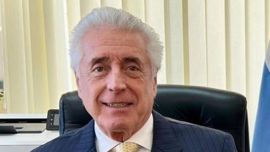Argentina’s ongoing battle against Covid-19 came into focus this week as the country surpassed the grim landmarks of two million coronavirus infections and 50,000 fatalities in the space of two days.
The news was confirmed by the Health Ministry, which at press time Friday updated its cumulative total to 2,008,345 confirmed cases of Covid-19 since last March. The death toll stood at 50,029, with Argentina now the 13th nation worldwide to record more than 50,000 fatalities.
The data means that at least 4.5 percent of Argentina’s 44-million-strong population have been infected with the novel coronavirus, which has sparked havoc across the world.
Of the reported cases, almost 1.8 million are now considered to be recovered patients, with more than 150,000 still suffering from the virus. Around 3,500 remain hospitalised in intensive care units, with occupancy in ICUs nationwide holding steady at close to 55 percent.
Buenos Aires Province, home to almost 40 percent of the population, leads the list of most-affected regions with 835,000 reported cases, followed by Buenos Aires City with close to 220,000.
Vaccination campaign
The national government launched an opt-in mass vaccination campaign on December 29, prioritising healthcare professionals and those aged over 70. In the coming weeks and months, vaccines will be offered to at-risk and other age groups in a descending manner.
Last week, the campaign expanded its network to include testing and vaccination points at football clubs, cultural sites and community centres.
At present, Argentina only has access to the Sputnik V vaccine, created by the Russian laboratory Gamaleya. Some 820,000 doses have been received to date in three shipments, with a new delivery expected to arrive in Buenos Aires late Friday evening, though officials said the departure of an Aerolíneas Argentinas plane carrying the shipment from Moscow was delayed due to a snowstorm.
Health Minister Ginés González García, speaking at a briefing to lawmakers last week, said that the national government has contracts in place to allow for the vaccination of the country’s entire adult population.
In total, provisions were in place for some 62 million vaccine doses from different laboratories, said the minister.
Argentina has agreements for 30 million doses of Sputnik V, 23.6 million of the AstraZeneca-Oxford University jab and nine million shots secured via the World Health Organisation’s Covax mechanism.
The Alberto Fernández administration is also in talks with China to secure at least one million doses of the Sinopharm vaccine, while officials have said local laboratories are keen to advance in the transfer of necessary technology to manufacture Sputnik V in Argentina.
In an interview with Radio Rivadavia, Buenos Aires City Health Minister Fernán Quirós said officials had told him that vaccines from India and China would "arrive by the end of the month."
Confirming that City Hall had used all 39,000 vaccines it had received on healthcare workers, he said that the rate of vaccination was "extremely slow," but that he was hopeful it would soon pick up.
Indian vaccine approved
On Tuesday, the government confirmed that the Indian-made Covishield vaccine had received emergency approval from the relevant authorities.
González García signed a decree granting "emergency authorisation" for the use of the vaccine, produced by India's Serum Institute, which was published by ANMAT, Argentina's drug administration agency, in the Official Gazette.
The Covishield vaccine is essentially the same as the British-developed AstraZeneca/Oxford vaccine that previously received approval on December 30. Unlike the Russian vaccine, it can be stored at standard temperatures.
The decree said that the Indian-made vaccine "results from the development of the production process carried out by the Serum Institute of India in collaboration with the University of Oxford and AstraZeneca in the context of a technology transfer."
ANMAT concluded that "said transfer [of technology] does not impact the quality, safety and efficacy" of the product that has already been approved in 13 countries, including India.
The decree indicates that "there have been no serious adverse events nor have significant differences been identified in the efficacy observed in the different age groups that participated in clinical trials."
In a post on Twitter, González García also revealed that Argentina has now detected two new coronavirus variants brought into the country by passengers arriving from Brazil.
"The Amazonas P1 variant was recently detected in two [patient] samples, and the Rio de Janeiro P2 variant in another two travellers. All of them [came] from Brazil,” said the official in a post on Twitter.
The laboratories of the ANLIS-Malbrán Institute, a specialist state epidemiology centre, were responsible for the detection of the virus variants.
– TIMES/AFP

























Comments